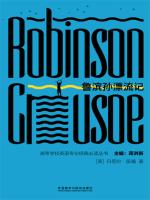Reading to Learn
The novel Robinson Crusoe tells the story of a young and impulsive Englishman who defies his parents' wishes and seeks adventure to the seas.
Experiencing many adventures on the seas, the young Robinson Crusoe is shipwrecked and castaway on a remote island for 28 years. During the years, he tries to keep time, build shelters, hunt for food, grow crops, tame and breed goats and so on in order to survive on the island. In the twenty-third year of his time on the island, Crusoe rescues a prisoner of the cannibals and named him Friday. He teaches Friday English and something else, and from then on Crusoe has a faithful partner and a useful helper to live with. At last, he takes opportunity to help a captain recover his ship and returns to England.
Robinson Crusoe is not only a character and protagonist in the novel, but also the narrator of the whole story. He, as the experiencer of the adventure, tells directly his varieties of experiences to audience, which makes the story more authentic and more attractive. As a character in the novel, Crusoe has his merits and shortcomings. He is determined and persistent: when he determines to take adventures on the seas, he defies his parents’ advice; he often reflects on himself after his behaviors and learn lessons from his reflection; he is good at seeking joy amid hardship, such as teaching a parrot to speak. However, Crusoe’s faults are just as apparent as his merits. He appears to consider himself, as a white European Christian man, to be superior to the darker skinned peoples of the world who follow other religions. The indigenous people of the Americas are routinely referred to by Crusoe as "savages", and the kindly Friday is referred to as a "savage" even after Crusoe has "civilized" him. Crusoe sets himself up as Friday's teacher. For a long time, he does not consider that he has anything to learn from Friday. But later he finds that He has bestowed upon the “savages” the same powers, the same reasons, the same affections and so on. He realizes “that when He pleases to offer them occasions of exerting these, they are as ready, nay, more ready, to apply them to the right uses for which they were bestowed than we are”. And this is a proof of his reflection on himself.
In brief, the first part of Crusoe’s life is “a life of fortune and adventure”. Without doubt, his survival through all these dangers and risks is amazing and legendary, and from it we can learn something meaningful and beneficial to our real modern life.



 京公网安备 11010802032529号
京公网安备 11010802032529号